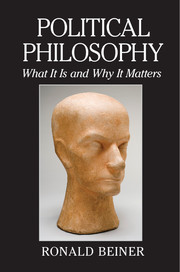Book contents
- Frontmatter
- Dedication
- Contents
- First Prologue: Horizons of Political Reflection
- Second Prologue: Freud, Weber, and Political Philosophy
- 1 Hannah Arendt: The Performativity of Politics
- 2 Michael Oakeshott: Life’s Adventure
- 3 Leo Strauss: The Politics of Philosophy
- 4 Karl Löwith: In Awe of the Cosmos
- 5 Excursus on Nature and History in the Strauss-Löwith Correspondence
- 6 Eric Voegelin: Modernity’s Vortex
- 7 Simone Weil: The Politics of the Soul
- 8 Hans-Georg Gadamer: Philosophy without Hubris
- 9 Jürgen Habermas: Politics as Rational Discourse
- 10 Michel Foucault’s Carceral Society
- 11 Alasdair MacIntyre: Fragmentation and Wholeness
- 12 Short Excursus on the Rise and Decline of Communitarianism as a Political Philosophy
- 13 John Rawls and the Death of Political Philosophy
- 14 Richard Rorty: Knocking Philosophy off Its Pedestal, or the Death of Political Philosophy Postmodernized
- Epilogue: On Not Throwing in the Towel
- Index
- References
Second Prologue: Freud, Weber, and Political Philosophy
Published online by Cambridge University Press: 05 August 2014
- Frontmatter
- Dedication
- Contents
- First Prologue: Horizons of Political Reflection
- Second Prologue: Freud, Weber, and Political Philosophy
- 1 Hannah Arendt: The Performativity of Politics
- 2 Michael Oakeshott: Life’s Adventure
- 3 Leo Strauss: The Politics of Philosophy
- 4 Karl Löwith: In Awe of the Cosmos
- 5 Excursus on Nature and History in the Strauss-Löwith Correspondence
- 6 Eric Voegelin: Modernity’s Vortex
- 7 Simone Weil: The Politics of the Soul
- 8 Hans-Georg Gadamer: Philosophy without Hubris
- 9 Jürgen Habermas: Politics as Rational Discourse
- 10 Michel Foucault’s Carceral Society
- 11 Alasdair MacIntyre: Fragmentation and Wholeness
- 12 Short Excursus on the Rise and Decline of Communitarianism as a Political Philosophy
- 13 John Rawls and the Death of Political Philosophy
- 14 Richard Rorty: Knocking Philosophy off Its Pedestal, or the Death of Political Philosophy Postmodernized
- Epilogue: On Not Throwing in the Towel
- Index
- References
Summary
Before we take up our twelve classics of twentieth-century political philosophy, I want to take a preliminary detour into texts by two thinkers who would seem to be involved in intellectual enterprises other than that of political philosophy – namely, Sigmund Freud and Max Weber. Neither Freud nor Weber thought of himself as a political philosopher, nor are they generally treated as such. So why commence a survey of twentieth-century political philosophy with a discussion of one of the twentieth century’s greatest psychologists and one of the twentieth century’s greatest sociologists? My purpose here is to clarify the scope of political philosophy as well as its unavoidability for any thinkers pursuing an intellectual engagement with grand issues of what it is to be human of appropriate breadth and comprehensiveness. That is, I think that looking at Freud and Weber helps to vindicate my idea of political philosophy defined in terms of super-ambitious reflection on the human condition, on “the ends of life,” on human experience per se in its normative dimensions. If the enterprise of political philosophy consists in reflecting on the totality of life in its most ambitious normative dimensions, then thinkers like Freud and Weber – “epic” theorists fully on a par with the political philosophers to follow – will be found to be practicing political philosophy whether they think they are or not. And if political philosophy turns out to be inescapable for those thinkers even if they seek deliberately to pursue their grand intellectual projects without it, that in turn will equip us with a better appreciation of why it matters for human beings as human beings. That is, if ambitious thinkers who are more or less determined to steer clear of political philosophy turn out to be far more deeply implicated in it than they want to acknowledge, then it may also be the case that the questions engaged by political philosophy are inescapable for all of us (philosophers and non-philosophers, intellectuals and ordinary citizens).
- Type
- Chapter
- Information
- Political PhilosophyWhat It Is and Why It Matters, pp. xxix - lviPublisher: Cambridge University PressPrint publication year: 2014



